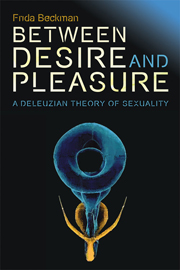Book contents
- Frontmatter
- Contents
- Preface
- Introduction: The Body without Orgasm
- 1 A Nonlinear History of Sexuality: Deleuze with Foucault
- 2 Psychoanalysis Unhinged: Deleuze with Lacan, Klein and Reich
- 3 Folding, Individuation and the Pleasurable Body
- 4 Orgasmic Feminism
- 5 Disabling Sex: Inventing a People who are Missing
- 6 Becoming-Animal and the Posthuman Orgasm
- 7 Capitalism and Sexuality
- Epilogue: Swedish Sin, or the Importance of Remaining Curious
- Bibliography
- Index
7 - Capitalism and Sexuality
Published online by Cambridge University Press: 05 October 2013
- Frontmatter
- Contents
- Preface
- Introduction: The Body without Orgasm
- 1 A Nonlinear History of Sexuality: Deleuze with Foucault
- 2 Psychoanalysis Unhinged: Deleuze with Lacan, Klein and Reich
- 3 Folding, Individuation and the Pleasurable Body
- 4 Orgasmic Feminism
- 5 Disabling Sex: Inventing a People who are Missing
- 6 Becoming-Animal and the Posthuman Orgasm
- 7 Capitalism and Sexuality
- Epilogue: Swedish Sin, or the Importance of Remaining Curious
- Bibliography
- Index
Summary
This is why the forms of human sexuality are so much about plugging up every orifice, by giving every partial object (desiring-machine) something to do, by turning all the desiring-machines into an orchestra that constantly play nothing but the sad and mournful riff of Oedipal sexuality.
(Lambert 2011: 143)Introduction
Where the previous chapters of this book have mapped the implications of Deleuze's rejection of pleasure as a productive force, and the possibilities that emerge if we recuperate pleasure as part of his philosophy along a number of tracks, one central question remains. Throughout the present book I have worked through different ways in which traces of the Oedipal and distinctly male linger in Deleuze's understanding of the orgasm and suggested ways in which a rethinking of sexual pleasure along more Deleuzian terms can assist in strengthening a Deleuzian conception of bodies, desires and pleasure. But if the Oedipal thus remains as a problem in his understanding of pleasure and desire, then what are the implications and possibilities of this when it comes to his and Guattari's understanding of capitalism? The link between capitalism and the Oedipal is at its most obvious, of course, in Anti-Oedipus, but the way in which Deleuze and Guattari let their understanding of desire take off and differentiate itself from a post-Freudian model continues to inform their philosophy at large.
- Type
- Chapter
- Information
- Between Desire and PleasureA Deleuzian Theory of Sexuality, pp. 145 - 169Publisher: Edinburgh University PressPrint publication year: 2013



